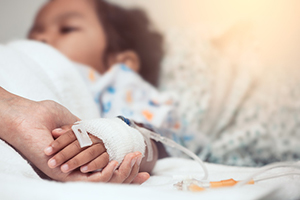In a Canadian study reported in the Journal of Clinical Oncology, van Warmerdam et al found that mothers and siblings of children with cancer were significantly more likely to have mental health–related outpatient health-care contacts than their general population counterparts.

Photo credit: Getty
The study involved linked data from the Ontario childhood cancer registry and Ontario health services. A total of 4,773 mothers and 7,897 siblings of children diagnosed with cancer between 1998 and 2014 were matched 1:5 to corresponding population controls. The two groups were compared for rates of mental health–related outpatient visits to family physicians or psychiatrists after childhood cancer diagnosis and incidence of severe psychiatric events as indicated by psychiatric emergency department visits, psychiatric hospitalizations, or suicide.
Key Findings
Compared with controls, mothers of children with cancer had a significantly higher rate of mental health–related outpatient visits (1,056/1,000 person-years vs 766/1,000 person-years, rate ratio [RR] = 1.38, P < .0001). Siblings also had a significantly higher rate of outpatient visits (104/1,000 person-years vs 95/1,000 person-years, RR = 1.09; P < .0001). Compared with controls, the cumulative incidence of severe psychiatric events at 20 years after cancer diagnosis was not significantly increased for mothers (13.2%; hazard ratio [HR] = 1.1, P = .33) or siblings (24.2%; HR = 1.0, P = .66).
On multivariate analysis, factors associated with increased risk of outpatient visits included greater number of children, past mental health use, and bereavement among mothers; and older age at diagnosis, age equal to or older than sibling with cancer, and rural residence among siblings. Factors associated with an increased risk of severe psychiatric events included younger maternal age at diagnosis, previous mental health–care use, lower income, and rural residence among mothers; and female sex, older age at diagnosis, same or older age than child with cancer, greater number of siblings, lower income, and rural residence among siblings.
The investigators concluded, “Both mothers and siblings experience elevated and prolonged need for mental health–related health-care as compared with the general population. Demographic risk factors predict subpopulations at highest risk. Increased psychosocial support for family members during and after cancer therapy is warranted.”
Sumit Gupta, MD, PhD, of The Hospital for Sick Children, Toronto, is the corresponding author for the Journal of Clinical Oncology article.
Disclosure: The study was supported by the Canadian Cancer Society, Ontario Ministry of Health and Long-Term Care, and Pediatric Oncology Group of Ontario. For full disclosures of the study authors, visit ascopubs.org.

